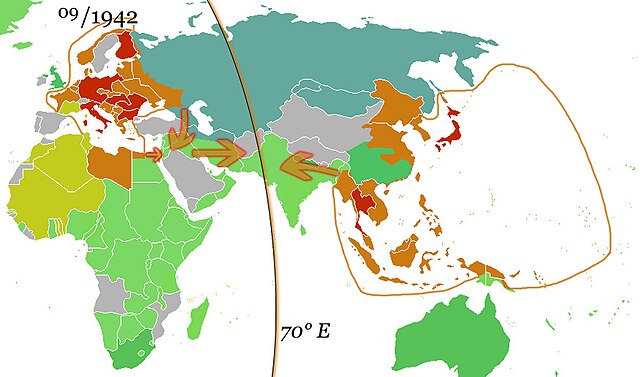- 26 Oct 2011 11:42
#13819347
There was a book entitled IIRC Uneasy Allies about the German-Japanese alliance in WWII. Given nazi racial doctrines, and Japanese use of anti-white/anti-colonialism propaganda, they were far from being natural allies. They were more like natural enemies, united only by having the same, more immediate enemies. I recall reading that after Singapore fell in '42, Hitler, citing the "yellow peril," rejected a proposed propaganda statement by Goebbels announcing this as a great victory for the axis. After hearing of British reverses Hitler was heard saying in private that he'd dearly love to give the British 20 divisions to help drive the yellow invaders back. I have little doubt that, had the common threat which united Germany and Japan ended, they'd go to war, if not right away, than maybe in 1950 or so.
Btw, had the axis won, n-bomb development probably would've been delayed in part because the reich was behind and a conventional victory would've reduced or ended the need for development of such a weapon.
Fasces wrote:The Cold War was the result of ideological and geopolitical competition between the United States and the Soviet Union. There is no such similar conflict between Japan and Germany.
There was a book entitled IIRC Uneasy Allies about the German-Japanese alliance in WWII. Given nazi racial doctrines, and Japanese use of anti-white/anti-colonialism propaganda, they were far from being natural allies. They were more like natural enemies, united only by having the same, more immediate enemies. I recall reading that after Singapore fell in '42, Hitler, citing the "yellow peril," rejected a proposed propaganda statement by Goebbels announcing this as a great victory for the axis. After hearing of British reverses Hitler was heard saying in private that he'd dearly love to give the British 20 divisions to help drive the yellow invaders back. I have little doubt that, had the common threat which united Germany and Japan ended, they'd go to war, if not right away, than maybe in 1950 or so.
Btw, had the axis won, n-bomb development probably would've been delayed in part because the reich was behind and a conventional victory would've reduced or ended the need for development of such a weapon.






















 Halo is cool, but a bit too dark (visually speaking) - specially ODST. This is no problem online though.
Halo is cool, but a bit too dark (visually speaking) - specially ODST. This is no problem online though. 





